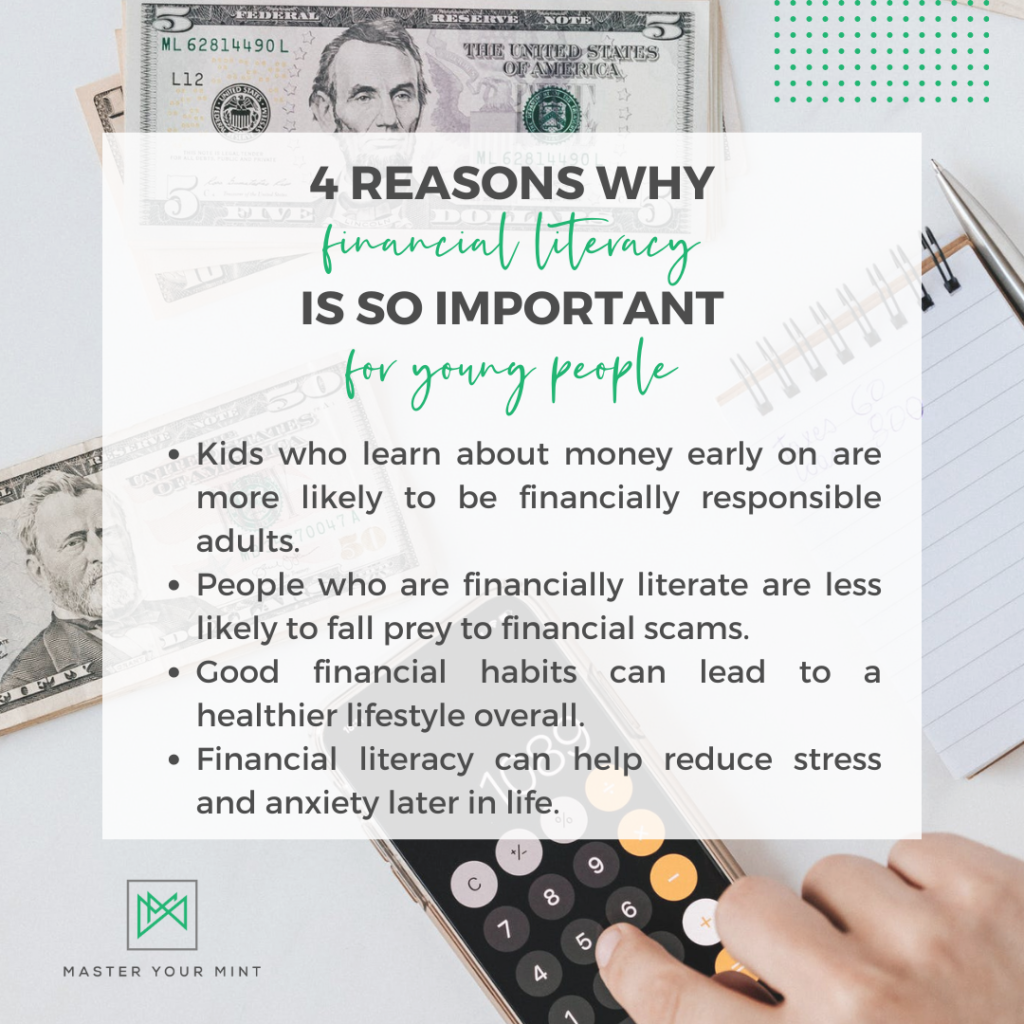It’s Never Too Early for Financial Literacy
Welcome to the Blog.
Tips to help you run your businesslike a business
Sign up for my newsletter for weekly business and tax support
First Name
Email Address
Submit
Get my latest book
GROUP
September 19, 2022

It’s never too early to start teaching your kids about money. In fact, the sooner you start, the better off they’ll be. Why? Because financial literacy is important for everyone, but it’s especially crucial when you’re a young person trying to make your own way in life.
Teaching young children about money can help them develop essential skills and knowledge that will last a lifetime. They can learn basic concepts like waiting for things we want until we can pay for them, or having to work to earn money. It’s also important to make sure that any kids understand their credit score and how it can impact their creditworthiness.

Here are a few tips to get you started on teaching your kids about money:
- Start early and be consistent. The earlier you start talking to your kids about money, the better. Try to make money discussions a regular part of your family life so that it becomes second nature to them. This will help normalize the topic and make them more comfortable talking about money as they get older.
- Use relatable examples. When you’re talking to kids about money, use examples that they can relate to in their own lives. For instance, if you’re trying to teach them about budgeting, you could talk about how you have to choose between buying a new toy and going out for ice cream because you can’t afford both.
- Keep it simple. Don’t try to overload your kids with too much information at once. Start with the basics and build from there as they get older and are able to understand more complex concepts. For example, you could talk about how a savings account works and why it’s important to start one as soon as possible.
Young children can understand basic concepts like waiting for things we want until we can pay for them, or having to work to earn money. You can also help kids with financial literacy by teaching them the difference between wants and needs, helping them create a budget, and encouraging them to start saving early for long-term goals. By instilling these values early on, you’ll set them up for success later on in life!

Here are four reasons why financial literacy is so important for young people:
1. Kids who learn about money early on are more likely to be financially responsible adults.
- Sit down with your kids and explain how savings accounts work. Show them how interest can help their money grow over time. Help them set up a savings goal and talk about different ways they can save up for it.
- Teach them about budgeting and explain why it’s important to live within their means. You can give them an allowance and have them track their spending for a week or two so they can see firsthand how quickly money can disappear if they’re not careful with their spending.
- Talking about investments is a bit more advanced, but if your kids are interested, take the time to explain how stocks and bonds work. Help them understand the risks involved so they can make informed decisions when they’re older.
2. People who are financially literate are less likely to fall prey to financial scams. – A lot of financial scams target people who are not well-versed in personal finance. That’s why it’s important to teach your kids about different types of scams and how to avoid them.
Here are a few examples of common scams to look out for:
- “Phishing” scams involve someone trying to trick you Into giving them your personal information, like your Bank Account Number or Social Security number. They might do this by sending you an email that looks like it’s from a legitimate company, or by setting up a fake website that looks identical to a real one.
- “Investment” scams often target retirees or other people with money to invest. The scammer will promise high returns with little or no risk, but they will actually just take your money and disappear.
- “Identity theft” occurs when someone steals your personal information and uses it to open new accounts, make unauthorized charges on existing accounts, or even commit crimes In your name. This can wreak havoc on your finances and cause years of headaches To clean up the mess.
3. Good financial habits can lead to a healthier lifestyle overall. – Living within your means, being mindful of your spending, and saving for future goals are all part of maintaining good financial health. But did you know that these habits can also lead to better physical health? That’s right—according to recent studies, people with good financial habits tend to have lower levels of stress, which in turn leads to better physical health. So not only will teaching your kids good financial habits set them up for success later in life, but it could also help them enjoy better physical health!
4. Financial literacy can help reduce stress and anxiety later in life. – Money is one of the leading causes of stress for adults, so imagine how much MORE stressful life would be if you didn’t understand how money works! When you don’t have a firm grasp on personal finance basics, everyday expenses can feel like a constant battle. This uncertainty and stress can take a serious toll on your mental and physical health over time. But when you ARE financially literate, you’ll have the knowledge and confidence you need to make sound financial decisions, reducing stress and anxiety in the process.
If you need more help, don’t hesitate to reach out and BOOK A CLARITY CALL with me! I can give you tailored advice on how to improve your family’s finances and set everyone up for a bright future.